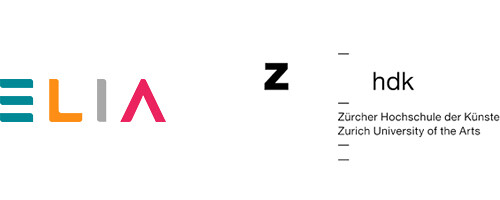Pfingstweidstrasse 96
8005 Zürich
Switzerland
ELIA is excited to announce that Zurich University of the Arts (ZHdK) is hosting the 16th edition of the ELIA Biennial Conference from November 18 to 21, 2020 in Zurich, Switzerland.
The Steering Group of this event invites colleagues to contribute to the programme with their most innovative projects.
Theme
New ideas, new concepts, the new itself most commonly arises at the edges or at the interfaces between traditional disciplines—be it in arts, sciences or everyday life. It is often this space in between—virtual or physical—where we as academics, artists or creatives can invent, innovate, compose and create. We can explore the limits of our doing and test the boundaries between different worlds, disciplines and concepts. At the same time, we can shape and reflect on our practices, and, by exploring the limits, expand the arts. The ELIA Biennial 2020 is dedicated to these edges and interfaces. We want to explore new hinges between the most diverse disciplines in arts, science and society, both inside and outside the walls of academies and universities.
The concept of transdisciplinarity appears as a form of cooperation that opens up innovative perspectives, questions and solutions. Today, thinking and reflecting across disciplines has almost become a ‘must’. In this context, transdisciplinarity in the arts goes beyond breaking silos between artistic disciplines as different as design and music. It raises the question of how arts and creative practices can collaborate with other fields to come up with innovative solutions and new formats.
Transitioning from STEM (science, technology, engineering and mathematics) to STEAM is a matter that has been brought up in the policy agenda. Integrating the perspectives of arts and design into the classical STEM-canon could possibly help to cope with the upcoming ecological, economic, social and cultural challenges of the future.
The ELIA Biennial 2020 wants to relate these developments to the reality of higher arts education institutions.
Leading questions:
–How can arts universities take on an active role in the debate around transdisciplinarity?
–Is the comprehensive and transdisciplinary arts university a model for the 21st century? Or is it a concession to the economy of scale, the imperative of efficiency?
–How can small mono-disciplinary institutions take part in such a process and debate?
–Does transdisciplinarity change the way arts subjects are considered, and curricula are developed?
–How can we achieve the same level of quality and critical reflection in one discipline while collaborating across disciplinary boundaries inside and outside the arts?
What are we looking for?
–Projects in teaching and in research which are considered to be transdisciplinary or question this concept;
–Initiatives involving students as well as teaching and/or research staff in innovative ways to promote transdisciplinary collaborations;
–Proposals focusing on transdisciplinary institutional development, which might be in dimensions of content, methodology, organisation or all three;
–Unfinished projects that address problems in favour of solutions and are willing to discuss their inherent dilemmas or critical questions;
–Submissions that expand and challenge the format. We aim to have proposals that are interactive, surprising, involving the audience and are not merely an academic paper presentation.
Who can apply?
Representatives of ELIA member institutions from all artistic disciplines such as lecturers, researchers, artists, students, senior managers, administrators, international officers are welcome to submit proposals.
Projects involving students or by students are encouraged.
Artists, cultural organisations, professional practitioners from the cultural sector are welcome to apply in collaboration with ELIA member institutions.
Procedure: application and selection
Think outside of the box! Your chosen format should include a lively debate or form of co-creation.
If you wish to submit a classic academic paper and it is selected, please notice that you will be required to provide the final version 1 month before the start of the conference (October 2020). The paper will then be published and shared with delegates prior to the event.
The required information should be filled in on the submission form available at the ELIA Biennial Conference 2020 website.
The working language of the ELIA Biennial Conference is English. Submissions should be sent by January 6, 2020 at the latest.
About ELIA
ELIA is a globally connected European network that provides a dynamic platform for professional exchange and development in higher arts education. With over 250 members in 47 countries, it represents some 300,000 students in all art disciplines.


